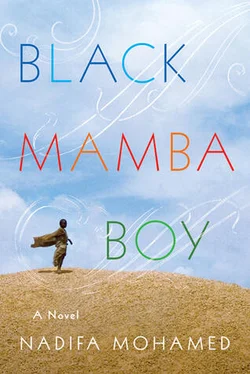Joe flung his hands up in frustration. Jama watched Joe out of the corner of his eye, but he didn’t move, he fell into a heavy sleep, filling the air with his resonating snores. Jama wished that his own father had fought to get back to his family the way Joe did. In the morning, an off-duty policeman with stars on his breast came passing through the carriage, a fat blond child in a stained white shirt and navy shorts holding his hand. The senior policeman stopped in front of Jama and called for his deputy by sticking his newspaper in the air, and a man in a crumpled uniform hurried toward him.
“Have these boys been given breakfast?” the boss asked, looking at Jama’s and Liban’s dry white lips.
“No, sir,” said the deputy.
“Get them food and water. What have they done?” said the boss.
“They came into Egypt without papers, sir, we are taking them to the Palestinian jail.”
The boss looked at Jama and Liban — like disheveled crows they sat there, with messy black hair, their thin limbs visible through their dirty clothes — and back to his plump-cheeked son.
“Let them go at Al-‘Arish, they won’t survive prison,” he said before dragging his son into the next carriage.
The deputy kept his word, bringing them bread and water, and when they reached Al-‘Arish, Jama persuaded the deputy with a little of Joe’s money to let Joe alight with them. An old policeman was sent with the gang. Al-‘Arish was a beautiful seaside town, with a yellow beach caressed by white surf. Palms on the shore shook their fronds in delight. The old policeman handed them over at the police station. The belligerent rural policemen shouted “Yallah! Yallah!” as they herded the men into a jeep and then swept them toward the border with Palestine. They reached Rafah in a few hours and the sergeant turned to face them. With a dirty finger poking into their faces, he shouted, “You blacks come into Egypt again and I’ll personally make sure that you all spend a year in jail, understand me? Yallah, get out!”
Joe opened the door of the jeep and pulled Jama and Liban out with him, screaming back at the deputy in his own language. Joe took charge now that they were in Palestine, walking them toward a British army canteen he knew from his boxing days. Jama was fearful of the reception they would get from the Palestinians but all they saw were a few hunched men leading heavily laden donkeys. To the side of the road, Joe saw the walls of an orchard and peered over. He threw Jama and Liban over the top and then jumped over the high wall as if it were a chicken coop. Inside, the orchard was a sight worthy of paradise, with bright globes of nectar hanging heavily from green trees. Jama felt as if he had not tasted an orange in centuries. They ravished the trees, squatting in the cool, fragrant shade and gorging themselves. The sticky juice ran all over their arms and chests, seared their lips, and attracted bees, but it was worth it. Before they could doze, they heard the orchard gate scrape open and an old man’s lamentful mutterings; they quickly fled back over the wall.
When they reached the canteen, a Palestinian chef raced over to them and embraced Joe wholeheartedly, without any of the bigotry Jama had expected. Joe threw his heavy arm over the Arab’s shoulder and led him away to talk quietly. When they returned, the chef asked Jama and Liban if they had really worked as galley boys on British ships, and they convinced him with enthusiastic tall tales. The chef offered them work in the kitchen.
Joe held the top of Jama’s head in his massive palm. “Petit garçon, you have no problem now, good pay, good food, Allah rewards the kind,” he said, kissing Jama on the cheeks before pulling money from his pocket and shoving it into their hands, “Take, take, merci, merci.”
Jama and Liban weakly resisted before accepting. Joe stayed for a last meal with them before wandering away with old acquaintances and disappearing into a lorry. He gave them a thumbs-up before zooming off into the distance and returning to his wife and daughter. Jama felt as if a mantle had been pulled off his back. As darkness fell, Jama and Liban grew afraid; they were two African boys in a congregation of Arab men and they had lied to them.
“What will happen tomorrow when they realize we don’t know what we’re doing?” asked Liban looking over his shoulder.
“I don’t know, but we’ve already lied, they’re going to be angry.”
The chef cheerfully brought them dinner and laid down canvas sheets in the storeroom for the night. “See you bright and early, boys; I need the best of you two.” Jama and Liban smiled and nodded at the chef, pretended to bed down but instead they sat up, waiting for the dawn. When the first slivers of light were visible through the barred windows, Jama and Liban grabbed their meager belongings and ran away. They were afraid of the Arab soldiers but more important, they had not left home to work in a canteen in a Palestinian border town and their destiny demanded another throw of the dice. They avoided the road, walking along the dunes, just keeping the stretch of tarmac in sight. They had made a mistake in not bringing food and water, and by midday they needed to rest under a tree.
“You only see a dead man sitting under a tree,” panted Liban. The gravity of their situation was beginning to dawn on Jama when a group of dark men appeared in the distance.
“Police, police!” hissed Liban. “Quick, behind the tree!”
Jama and Liban each nudged the other, believing their harsh breathing would give them away, but it was the banging of their heartbeats that seemed so loud. They could hear footfalls and voices a few meters away; the language sounded strange to Jama, guttural and accusatory, and it took him a few moments to recognize it as Somali. He poked his head out and saw Bootaan, Rooble, Samatar, Keynaan, and Gaani from the apartment in Alexandria walking past, arguing among themselves.
Jama ran out after them. “Waryaa! Waryaa! Wait for us!” he yelled.
The men looked back in shock before falling about in laughter. “Would you look at them? You look like jinns,” laughed Rooble, picking leaves out of Jama’s hair. “What happened to you?” he asked.
“We got jailed in Port Said and they brought us here,” said Jama, delighted. It had been a deep worry to him that no one knew where they were, that Bethlehem would never know what had become of him.
“Where are you going now?” asked Gaani of them, as if they were crazy children.
Jama and Liban looked toward each other. “We don’t know,” they said in unison. The older men, older only by a few months or years, tutted and shook their heads. “First get to Gaza. There is a Somali man always at the bus stop, Musa the Drunk, he will find you. Tell him to put you on the bus for Sarafand. In Sarafand there are Somali men working for the British. One of them is your people, Liban, and one yours, Jama, but they will all give you money and then you can go where you like,” counseled Samatar.
“Yes, that’s right, that’s what you should do,” agreed the others.
They pointed out the way to Gaza and then turned back toward Sinai. Jama and Liban followed the route the men had cursorily pointed out. Most Somalis avoided sharing the precise routes and tricks that they hoped to benefit from themselves, as they did not want to be beaten to a ship, and careless words might put border guards on their trail. They turned away from the road when they heard an army lorry approaching, but it was traveling so fast it was upon them in seconds. It slowed down beside them and Joe Louis stuck his head out the passenger window, squinting in disbelief. “Jama? Liban? Garçons? Where you walking to?”
Jama and Liban raced each other to the window to explain their predicament. Jama forced his voice over Liban’s. “He was a very bad man, Jow, we woke up in the morning, worked for him and then he sent us away, he wanted to give the work to his Arab friends.”
Читать дальше
Конец ознакомительного отрывка
Купить книгу












